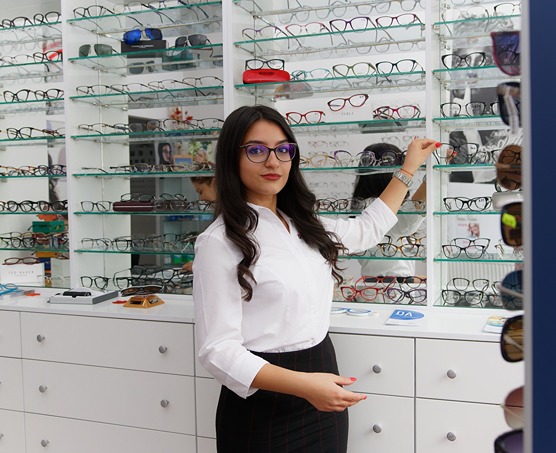What Is The Difference Between an Optometrist, Ophthalmologist and Optician?
If you are looking for a sight test or contact lens fitting or if you need to go to the eye hospital you will encounter eye health professionals, all with similar titles, Optometrist, Ophthalmologist, Optician, Dispensing Optician, Orthoptist and even Ophthalmic Medical Practitioner, but what do all those titles mean and what do they do?
We will help you navigate your way around the eye health professionals you'll encounter either in the high street practice or at the eye hospital. The best way to distinguish between the various professions is to know what they can and can't do, how long they train and what exactly all those letters after their name mean.
What Is An Ophthalmologist?
Ophthalmology is a clinical and surgical speciality that handles the diagnosis and treatment of eye disorders.
An Ophthalmologist is a medically trained doctor who has further specialised in eye care, they can diagnose and treat eye-related problems such as cataracts, glaucoma and retinal conditions. And they are also qualified to perform laser eye surgery.
Although an Ophthalmologist is qualified to test eyes you won't normally encounter them in the Optician's practice and only get to meet them if you are referred to an eye consultant by your Optometrist or family Doctor.
Training
- 5 years of medical training.
- 2 years as a qualified doctor doing basic medical training.
- 7 years of ophthalmic specialist training.
Individual Ophthalmologists may also undergo further training
Qualifications
- F.R.C.S. (Edin) - Fellow of the Royal College of Surgeons.
- F.R.C.Ophth (London) - Fellow of the Royal College of Ophthalmologists or
- M.RC - Member of the Royal College of Ophthalmologists.
- R.S.C. (Europe) - Royal College of Surgeons.
- D.O.M.S. - Diploma in Ophthalmic Medicine and Surgeons.
Many Ophthalmologists go on to undertake further training, thereby adding extra letters after their name e.g. D.O.M.S. - Diploma in Ophthalmic Medicine and Surgeons. All Ophthalmologists in the UK must be registered with the General Medical Council.
What Is An Optometrist?

An Optometrist was previously known as an Ophthalmic Optician, they are a qualified primary health care specialist who can detect visual defects, signs of injury, ocular diseases and abnormalities. He/she can perform sight tests and contact lens fittings and prescribe glasses as well as contact lenses. If an Optometrist detects eye issues they cannot deal with they will refer you either to your GP or an Ophthalmologist.
Training
- 3 years to obtain a BSc (Hons) degree in Optometry.
- 1 year pre-registration work placement with a registered optometrist.
Qualifications
- BSc - (Hons) Bachelor of Science (Honors).
- MCOptom or MBCO - Member of the British College of Optometrists
- DipCLP or DCLP - Diploma in contact lens practice.
- All Optometrists are registered with the GOC (General Optical Council) to find your optometrist check out the GOC register.
What is the difference between an Optometrist and an Ophthalmologist?
They are both able to test eyes but it is an Optometrist who you will mainly see for an eye test and contact lens fitting etc, but should you need treatment for a cataract or surgery etc then your Optometrist will refer you to the Ophthalmologist for treatment. An ophthalmologist is a medically trained doctor, whilst an Optometrist is a qualified practitioner of primary eye healthcare.
What Is An Ophthalmic Medical Practitioner?
Ophthalmic Medical Practitioners (OMP) are registered doctors who have undergone further training in ophthalmology, they are then qualified to test eyes, diagnose eye conditions and prescribe glasses or contact lenses, just like an Optometrist. However, they are also qualified to undertake eye surgery, for example cataract removal and can prescribe medication. In addition, they will diagnose and treat eye diseases, usually in a Hospital setting, that are referred to the hospital by Optometrists or your Family General practitioner. In the course of a working day clinic, they would manage many cases of glaucoma, cataracts, retinal disease and other eye conditions.
Like optometrists, they examine eyes, test sight, diagnose abnormalities and prescribe suitable corrective lenses. Visit the Royal College of Ophthalmologists website to find out more.
Training
- 5 years of medical training.
- 2 years as a qualified doctor doing basic medical training.
- year training in Ophthalmology
Qualifications
- MD AnD, MBChB or MBBS - Bachelor of Medicine & Bachelor of Surgery.
- MRCGP (UK) Member of the Royal College of GPs
What is a Dispensing Optician?
A dispensing optician (DO) is qualified to dispense, fit and supply spectacles, dispense low vision aids to the partially sighted and can also advise on and dispense glasses to children.
Following further training, a DO can fit and provide aftercare for contact lenses.
Training
- 3 years of academic and practical training.
Qualifications
- FBDO Fellow of British Dispensing Opticians.
All dispensing opticians must be registered with the General Optical Council (GOC) to practice in the UK.
What is an Orthoptist?
An Orthoptist is qualified to diagnose and treat defects in binocular vision - how the eyes work together. They deal with people experiencing symptoms such as blurred, oscillating or double vision and strabismus commonly known as a squint.
Interestingly the word Orthoptist comes from the Greek word orthos, meaning ‘straight’, and optikos, meaning ‘relating to sight’.
The term Orthoptist is protected by law, and can only be used by those individuals registered with the Health and Care Professions Council (HCPC).
Training
- 3-year degree course incorporating 30 weeks of practical experience in a clinical setting.
Qualifications
- (BSc) in Orthoptics.
All Orthoptists must be registered with the Health and Professional Council (HCPC) to practice in the UK.
What is an Optician?
The title Optician was traditionally used by Ophthalmic Opticians but this was sometimes confused with Dispensing Opticians, so the title was changed from Optician to Optometrists to help prevent confusion between the two professions.
Today Optician on its own only refers to the high street practice, as in "I'm going to the Opticians"
The term Optician is still used by many people to describe the person who tests their eyes and prescribes glasses or contact lenses.
What is an Optical Receptionist?

An optical receptionist sometimes referred to as an optical assistant is normally the first person you will meet at an optician, they answer the phone, make appointments, maintain customers' records and they can assist the Optometrist with pre-tests.
Optical Receptionists can help with the selection and fitting of glasses and often teach new wearers how to use and care for contact lenses.
Training
- Normally training is provided by the optical practice, however there is an Optical apprenticeship that can take around a year to complete. This results in an industry-recognised qualification, such as a Level 2 retail optical assistant.
Qualifications
- There are no specific qualifications but a good general education and the ability to understand written and spoken instructions, plus a good understanding of IT skills would be beneficial.

